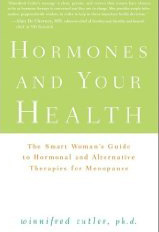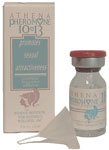
Chapter 11:
Hormones and the Brain: Preserving Memory, Alertness, and Optimism
We hope you "Look Inside" Dr. Winnifred Cutler's essential book; an excerpt from Chapter 11 for readers.
Click here for full book description
Copyright © 2009 John Wiley & Sons, Inc.
Hormones and Your Health: The Smart Woman's Guide to Hormonal and Alternative Therapies for Menopause
Excerpted pages .211 – 213, 217, p 223
Memory
Dementia describes severe symptoms of memory loss that occur without compromising the normal arousal of emotion, such as anger or joy. Strokes and Parkinson’s disease are common dementia-inducing illnesses.408 Alzheimer’s disease accounts for 60 to 80 percent of the cases of dementia.
Take action now, through the habits you form, to keep your blood vessels healthy. your mind sharp. and your memory fluent. Add to the vibrancy of your own optimal mental energy by adhering to healthful patterns of eating, exercising, cultivating a rich spiritual life, and undertaking correctly timed hormonal therapies.
Memory and Age
Cognition includes perception, memory, and judgment.830 Tests of 800 upper-middle socioeconomic California women (older than 64 years in 1972) on 12 cognitive skills showed real vulnerability to aging. Ten of the 12 test scores had clearly declined 15 years later.52
Memory and Menopause
Before menopause, mental capacity tends to be stable.345 The greatest predictors of a 53-year-old woman’s IQ, verbal memory, and concentration at early menopause are the combined effects of childhood cognitive ability (tested at age 8) and lifetime socioeconomic circumstances.49, 410, 424 But after age 60, for most women, memory gets worse.553
Since a clear decline in mental function seems to begin about 10 years after menopause, researchers began to ask whether declining sex hormone levels might be responsible. If so, would adding HRT help? In 2005, some researchers said no.471 But the first researchers asked the question the wrong way and drew an invalid conclusion.
Just because it’s “research” doesn’t make it right. The mistake they made? They relied on the women’s memories at age 70 when they were asked for their ages at ending—and starting—menstruation and compared that data with their mental ability scores. If their memories were declining, their data were unreliable and the findings would be flawed.
By 2007, there were enough published valid data to prove exactly the opposite conclusion. Yes, naturally secreted estrogen, progesterone, and testosterone, before menopause, all serve to keep the intellect functioning optimally. Timely initiation of hormone therapy—an early start—seems best for reducing the likelihood of intellectual and hearing deficits 10 to 30 years later.117, 343, 486, 643––And a healthy cardiovascular system that provides freely flowing blood to nourish the brain and the central nervous system seems crucial.
Memory and Cardiovascular Disease
People with cardiovascular disease are more at risk for developing memory problems. People (ages 53 to 84) with hypertension or poorly controlled blood pressure show an “exaggerated neuroendocrine reactivity”—extreme sensitivity—to stress.8 They tend to perform worse on cognitive tests, even when they have not had a stroke and are still free of dementia.812 And treatment for hypertension improves cognitive test scores. That makes sense: the brain needs blood to supply nutrients, and any impairment in the cardiovascular system would necessarily weaken mental abilities. Check your blood pressure and take action to keep it within reasonable bounds.
Current users of estrogen therapies showed a better aging cognitive profile than “never-users” in one large study, except for a subgroup of women with a genetic blood-fat abnormality.861 That lipoprotein abnormality (APOE e4 allele) increased the risk of women developing Alzheimer’s disease if the subgroup had a longer span of reproductive life. For the main group, a later menopause did not increase the risk.262 A likely explanation: cardiovascular diseases block the benefit that sex hormones provide. So estrogens are helpful, provided that the blood vessels—and their contents—are in good shape.
Poor sleep is also a serious health concern that is associated with an increased risk for coronary artery disease, as well as for death from heart disease.249 Women who had nightmares more than once per week also tended to have spasmodic chest pains, as was shown in a study that collected data from 6,000 women, ages 40 to 64. Since these symptoms may reflect coronary artery disease, women with sleep disturbances should have their cardiac symptoms evaluated.30 We need good circulation, and we need to sleep restfully.
Estrogen and the Central Nervous System
When we consider estrogen’s effects on the brain and the nerves, we hit the mother lode! Estrogen promotes the growth of neurons, prevents atrophy of neuronal nerve cells, regulates the plasticity of the synapses—those connecting sites from one nerve to the next—and increases a key enzyme that is needed for learning and memory, choline-acetyl-transferase.21
Estrogens also act as neuroprotectants because, unlike the other steroids, they are antioxidants. (Oxidative stress and free radical damage also contribute to Alzheimer’s disease pathology.) This antioxidant activity of estrogen protects our nervous systems.521 So, although a number of hormones are integrally involved in stress, cognition, and well-being, estrogen appears to be particularly beneficial. Let’s look at specific areas of the brain and the corresponding mental functions affected by the remarkable female sex hormones.
Prefrontal Cortex
Executive functioning describes a cognitive skill of learning and subsequent memory that involves formulating successful plans and prioritizing one’s actions. Brain-imaging studies have shown that the front, or prefrontal cortex of the brain, is actively “on fire” during executive-functioning activities.380 This area (near your forehead) is crucial for higher cognitive functions such as working memory, mental imagery, and willed action.
In one study, when ovariectomies (which eliminate the main source of female sex hormones) were performed on monkeys, it reduced the density of the nerves in the prefrontal cortex, creating a “dumbed-down” animal. Estrogen and progesterone restored the diminished nerves’ density.395 There is a close parallel in humans, as the following study of forty healthy women shows.
In 2006, using high-resolution MRI brain imaging, researchers in Italy reported significantly more “gray matter” in castrated women who were using estrogen vs. those who used no hormones. Gray matter is the part of the brain that is composed of nerve fibers: the electrical circuitry required for thinking. Former and current estrogen users showed significantly better cognitive ability than did those who had never undergone hormone-replacement therapy. The anatomical findings matched the cognitive test results. Former estrogen users also had more gray matter than did those who had never used estrogen.85
What you should know:Sex hormones protect against the age-related loss of brain tissues.
More Beneficial Estrogen Effects
- Estrogen increased the electrical activity in the frontal cortical regions of the brain when women took tests of verbal and spatial working memory.380 This occurred in monkeys, too, after they had ovariectomies but only if they were given estrogen promptly.708, 767
- Elderly people show reductions in the firing patterns of their prefrontal cortex nerves on MRI.21
- Hormone users performed better in tests of executive functioning in one study that used estradiol valerate and Dienogest,395 but not on another that tested estrogen with the synthetic progestin MPA.296 MPA was not a helpful hormone.
*** You should know: Not all estrogen is alike. Researchers have argued that the conjugated equine estrogens (such as Premarin, Prempro, and generic equivalents) do not produce these active results in the brain that bioidentical estradiol produces.314 This might explain why Prempro and Premarin were both associated with increased risks of cognitive declines in older postmenopausal women who started taking hormones 17 years after menopause (see pages 227). The WHI study reported an increased incidence in dementia in its Prempro users,629 which was attributed to cardiovascular clogging that caused strokes.
Also in this chapter:
- Mindful-based stress reduction
- Stress and Gender
- Hormone Prescriptions and Cognitive Function
- Develop a Compassionate Attitude and Get a Pet to Love!
END OF EXCERPT
Dr. Cutler's pheromone science has been "bottled" into vials of unscented fragrance additives that increase wearers' sexual attractiveness. AVAILABLE FOR PURCHASE HERE

